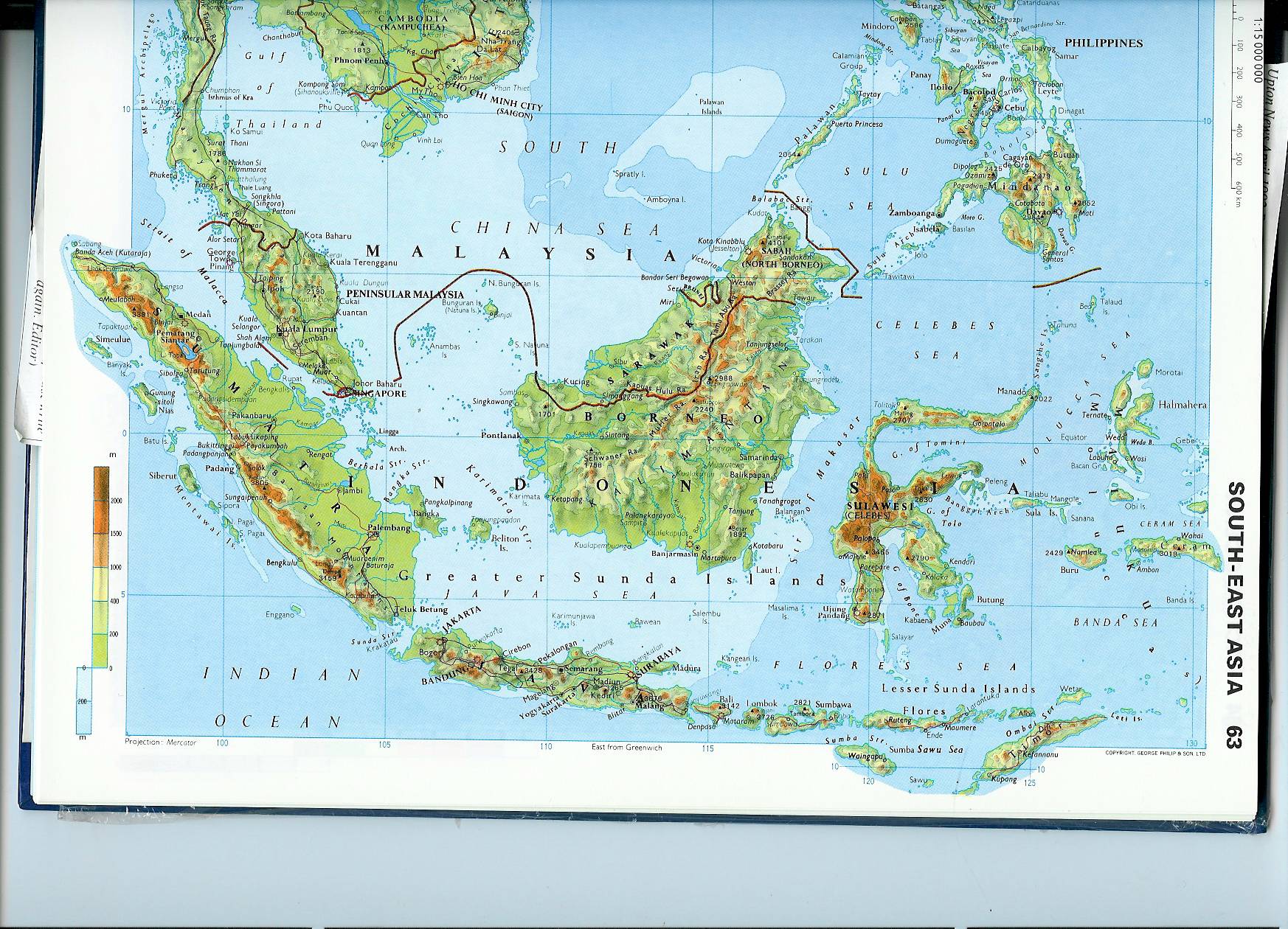
CHAPTER SEVENTEEN
SABAH
" LAND BELOW THE WIND"

My intended time of arrival at Sabah was Monday 5th February, at 11.50.a.m, however this was delayed until Wednesday 7th because there had been a strike at the airport at Kuala Lumpur. Elisabeth had taken me to Heathrow on the Saturday to catch my flight where we learned of the hitch. We contacted or friends Kay and Brian who still lived at Twickenham, who immediately came out to Heathrow to collect me and my baggage and took me to their home to put me up until I could get a flight. My flight was then rearranged to leave Heathrow on the Monday morning instead. I had an overnight stay in Kuala Lumpur and then flew by 'Malaysian Airline System' to Kota Kinabalu in Sabah, via a stop over of a few hours in Singapore.
On arrival I was apprehensive, slightly bewildered and feeling very lonely. The walk from the aircraft to the reception was a distance of some 100 yards in a temperature of 90% with the sun immediately overhead. I couldn't see a friendly face and in view of the fact that I was 48 hours late I wondered whether my arrival would have been telegraphed ahead. The walk seemed interminably long as I moved out of the brilliant sun into the cool interior of the buildings and on through the Passport and Custom Check, being pushed by a throng of Malay, Chinese, Japanese and Indian passengers with still no sign of a friendly face. My morale was beginning to flag until I saw Dr Dingley waving and smiling, surging through the crowd to welcome me. The pace of life quickened and in a few short moments I was being introduced to a whole host of St John members, men, women, boys and girls all laughing and talking excitedly. Eager hands took my cases and very quickly I was whisked away in a convoy of Ambulances and cars to the St John Headquarters
As soon as I arrived at the Headquarters I was taken into an office, where with Doctor Dingley and the State Commander, Mr Rajah Indran (An Indian Hindu.) we immediately got down to the business of the trip. A programme had been compiled and we discussed what it was hoped I would be able to achieve.
The obvious needs at the time were in three separate directions -
It was hoped that the third object would be achieved by direct approach to Divisions already in existence but mainly by teaching in Teacher Training Colleges such as the 'Gaya' college. Here student Teachers would, on successful completion of their studies be sent to schools (Not necessarily of their own choice) throughout the whole of Sabah, Sarawak or Peninsular Malaya. It was therefore very necessary that I should pay particular attention in this field. Dr Dingley told me that there were other Domestic and External needs, which I would discover as I travelled around.
I was taken to meet the Vice President of the State, a Mr Jim RAJARATNAM, as a matter of courtesy, as some of the matters I would be dealing with were of National interest. He thanked me for coming and expressed a few points he would like me to consider on my way around. I was then taken to be measured for a tropical uniform as my own was much too heavy for the climate. I had already mentioned one or two misgivings I had about the condition of Headquarters and more importantly the ambulances to Rajah INDRAN but when the time came for me to leave these matters had been thoroughly dealt with.
My being invited as the Guest of Honour at the Rumah St John, where the nurses of the Headquarters Division
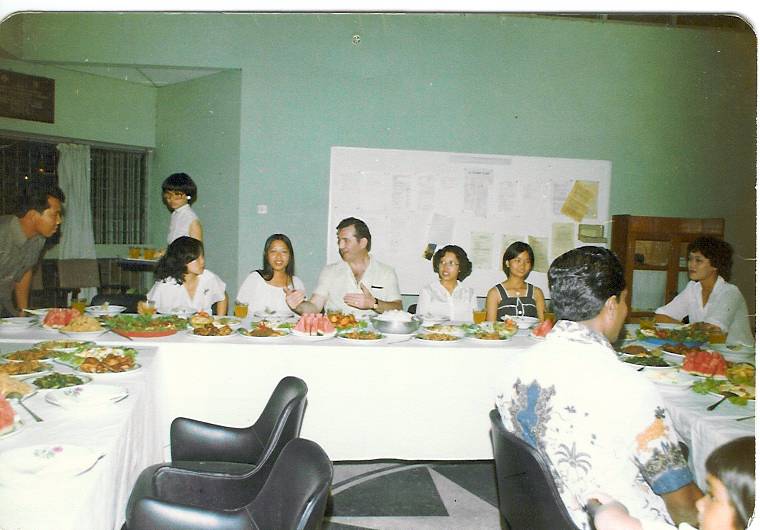 Entertained me with a grand feast, very pleasantly filled the Wednesday evening. I cannot claim that I was flattered by being asked if I was 'an eligible Bachelor', rather I was reminded of my age when one very attractive little Chinese girl told me she was 22 years old and I was older than her father, but nonetheless, the company and attention of these young ladies worked miracles on my ego. As a matter of interest the plaque on the wall over the window to the left of the picture is dedicated to the memory of Lady Louis Mountbatten, who as the President of the Order of St John, was visiting Sabah when it was still the Colony of North Borneo, collapsed and died in this room.
Entertained me with a grand feast, very pleasantly filled the Wednesday evening. I cannot claim that I was flattered by being asked if I was 'an eligible Bachelor', rather I was reminded of my age when one very attractive little Chinese girl told me she was 22 years old and I was older than her father, but nonetheless, the company and attention of these young ladies worked miracles on my ego. As a matter of interest the plaque on the wall over the window to the left of the picture is dedicated to the memory of Lady Louis Mountbatten, who as the President of the Order of St John, was visiting Sabah when it was still the Colony of North Borneo, collapsed and died in this room.
Being two days late meant radical changes at the beginning of my projected programme. The courses arranged for the first week were put back to the end of my visit; this in the end proved to be a fortunate thing as it gave me the opportunity to learn more about Industrial Injuries in other fields, particularly in the Logging business. I learned of the ridiculously high mortality rate in Industrial Accidents, some firms put it as high as 95%. I had no proof of this but even 50% is completely unacceptable. Moving into the Ports Authority at the end of my tour, with this kind of information was invaluable and lent more importance to my Instructing.
The Thursday was taken up with courtesy visits and a quick tour of Kota Kinabalu to find my bearings. A short instruction, with the organisers of the coming State First Aid Competitions was arranged. The equipment injury make up kit was obtained by a little Grand Larceny from a Childs toy box for plasticine for swelling, a raid into a nurses make up bag produced lipstick and eye shadow for bruising, some Irish Blarney in the Dispensary of the Queen Elizabeth Hospital acquire us some Imitation Blood, talc and Glycerine. I think my sanity was beginning to be doubted. We had a lot of fun and I think the organisers learnt a lot, there is nothing like laughter to make people relax and begin to communicate without any inhibitions.
The Friday morning was taken up by a Public Duty at the Padang, where a Muslim Service, Parade and Competition between the Mosques's was being held to celebrate the Birthday of the Prophet Mohamed. Considering the strong Religious bias I felt very strange performing a duty wearing the St John Cross among a denomination of people who have historically been the 'Bete Noir' of the Order. I searched in vain for another European face somewhere - anywhere, without success. It is incredible how alone one can sometimes feel in a vast crowd. That same afternoon I was taken to a site meeting at the City Football Ground in their new Sports Complex. There was to be a needle football match on the following day between Sabah and Penang. Apparently at the last Home match between Sabah and Singapore, at a crucial moment in the game, one of the spectators had blown a whistle, whereupon the Sabah goalkeeper thinking the game was all over started to walk off the pitch; the Singapore striker promptly put the ball into the back of the net and the referee allowed the goal. The spectators immediately invaded the pitch, beat up the referee and any members of the Singapore team who were not swift enough to get to their dressing room, (Not a good time to hang around to sign autographs). Sabah was on trial - if this type of thing occurred again, it was unlikely that the Malaysian Authorities would allow another Home League game in Sabah. With Dr Dingley we were hoping to make arrangements for the duty attendance and responsibilities of the St John. In the end however it was all a waste of time because the match had to be postponed due to yet another strike of the Malaysian Airline System.
The following morning the St John teams from all over the State arrived to take part in their National State Competition. In principal the Competition remained very much the same as those in this country except in addition to a Uniform inspection they also had a Marching and counter marching competition. They were impressively smart and it was an aspect of their Competition everyone taking part thoroughly enjoyed. However it is an aspect of training that I think the Brigade in this Country would not accept too readily; but it showed their military tendency, for my money however I would rather see nursing members walking in step rather than marching.
In my opinion, the standard of ability was poor, but if these were the cream of the State, it was a good exercise for me as it gave me an excellent viewpoint from where to start my lectures. I had the whole of the Sunday off and as it transpired the first and last day off in the remaining five and a half weeks remaining. I was accommodated for the few days with Rajah INDRAN and his wife and Daughter. Rajah's wife was Chinese and a Buddhist. On the Saturday he said to me that he had seen that I was a Roman Catholic, there was an English Mass at the Convent of an order of enclosed nuns in the city early on Sunday Morning, would I like to go? I said I would very much, but I did not expect him to put himself out for me. He told me he would arrange for someone to take me and I was to be ready at 7.a.m. at the time arranged I walked out onto the balcony of his home and was putting on my shoes when a large family saloon tore into the drive full of a Sikh family, Father, Mother and three teenage children. They all crowded out of the car and greeted me like a long lost relative, then rearranged themselves into the car, Father aiming the car (Driving was not the word that came to mind.) I sat in the front and spent the next hair-raising ten minutes furtively looking for the ejection seat button. Mother crowded into the back with the children all shrieking with laughter at the near misses. The car reeked of Curry and Indian food, but what a happy family they were!
The church was built on the top of a cliff, in accord with Chinese ying or yang or whatever the word is. I didn't see any of the nuns, but I could hear them as they were concealed from the congregation behind a curtain and wall. The Bishop of Sabah, the Very Reverend Simon, celebrated the Mass I was never told his family name. The congregation comprised of a polyglot of nations, but dominantly Chinese. The hymns were sung in English and so to was the dialogue and sermon. The hymns were good traditional ones as heard through most churches in the country, but it did seem odd to hear the Chinese really singing the western tunes with gusto heaven alone knows in what key, certainly a lot higher than any I could attain to. Immediately after mass Bishop Simon was out in the car park still vested directing traffic and being a brilliantly happy kind man, whom everyone seemed to love including the Sikh's, who roared with laughter when he asked me how had I managed to convert these pagans. During the weeks I was in Sabah I was to meet Bishop Simon on a number of occasions in different regions as I went around the State, he really was a delightful man overflowing with personality.
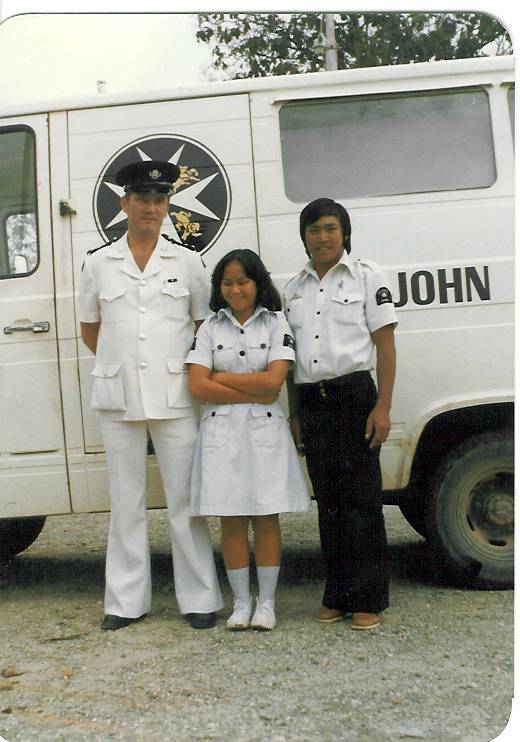 On the Monday I started out on my own and went to visit a Division in a place called KENINGAU. The Area President, Mr ALPHONSES who was to host me throughout, hosted me. On my arrival I was met by a large contingent of the local Division. The Officer in charge was only a one star Divisional Officer and the senior Female member was only a Corporal. The Division was quite a large Quadrilateral one. I felt it was really important that both these youngsters should be upgraded and given a rank commensurate with their responsibilities. The Division was greatly in need of a qualified First Aid Instructor and a Trained Nurse, ideally on loan from the local Hospital. During my visit I was able to show the three films made by the Royal Navy, and give the senior members some idea of the National Coal Board slides to enable them to increase their own scope in training. They did appreciate that even though the tapes used in conjunction with the slides are in English, they could in time be translated into 'Bahasa Malay'. One of the problems of teaching was the need to teach in both languages, I doubt whether the interpreter lent to me was able to lay stress on the same points in the native tongue as I did in English.
On the Monday I started out on my own and went to visit a Division in a place called KENINGAU. The Area President, Mr ALPHONSES who was to host me throughout, hosted me. On my arrival I was met by a large contingent of the local Division. The Officer in charge was only a one star Divisional Officer and the senior Female member was only a Corporal. The Division was quite a large Quadrilateral one. I felt it was really important that both these youngsters should be upgraded and given a rank commensurate with their responsibilities. The Division was greatly in need of a qualified First Aid Instructor and a Trained Nurse, ideally on loan from the local Hospital. During my visit I was able to show the three films made by the Royal Navy, and give the senior members some idea of the National Coal Board slides to enable them to increase their own scope in training. They did appreciate that even though the tapes used in conjunction with the slides are in English, they could in time be translated into 'Bahasa Malay'. One of the problems of teaching was the need to teach in both languages, I doubt whether the interpreter lent to me was able to lay stress on the same points in the native tongue as I did in English.
In Keningau I was accommodated in the 'Sabah Land Development Rest House' which was very comfortable, I understood these 'Houses' were a kind of chain of Guest Houses run by the State, and were situated in most towns across the State and supervised by local Government. The majority of the members of this Division live in the Jungle Kampongs. Communication is a very difficult problem and it is not possible for them to attend a regular weekly meeting. In fact, some of them can only make a journey into the town once a month.
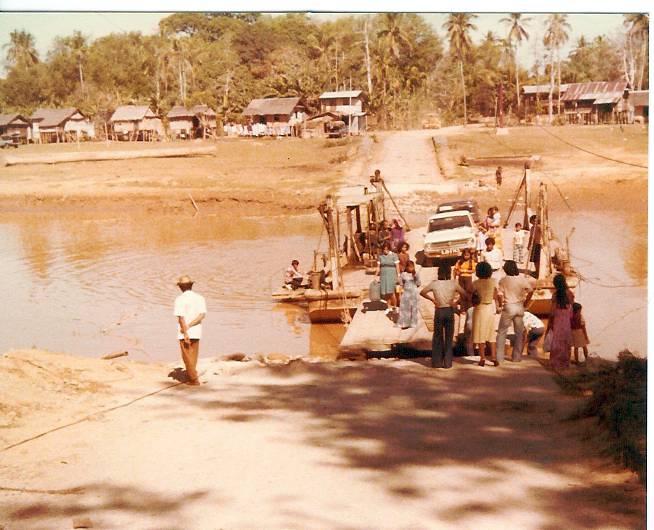 Keningau is a boomtown, importing a lot of outside labour into the logging camps. The companies were sustaining fatal and serious injuries whose condition deteriorated every day through lack of Basic First Aid skills. The larger firms did employ a nursing orderly but they were always kept centrally to allow them to be available as quickly as possible, unfortunately the accidents occurred in the remote areas where it was difficult to transport casualties over difficult terrain to get to a reasonable road. Even then once at the roadside there were often long delays before transport arrived, and in these early stages that simple injury is converted into serious, and serious into fatal. My point was taken seriously particularly by Mr Alphonses who was involved in timber exploitation himself, and was therefore keen to initiate training within the industries in that area. I suggested the possibility of a nominal payment, as a stimulus to the qualified who would be expected to exercise their skills in the industries.
Keningau is a boomtown, importing a lot of outside labour into the logging camps. The companies were sustaining fatal and serious injuries whose condition deteriorated every day through lack of Basic First Aid skills. The larger firms did employ a nursing orderly but they were always kept centrally to allow them to be available as quickly as possible, unfortunately the accidents occurred in the remote areas where it was difficult to transport casualties over difficult terrain to get to a reasonable road. Even then once at the roadside there were often long delays before transport arrived, and in these early stages that simple injury is converted into serious, and serious into fatal. My point was taken seriously particularly by Mr Alphonses who was involved in timber exploitation himself, and was therefore keen to initiate training within the industries in that area. I suggested the possibility of a nominal payment, as a stimulus to the qualified who would be expected to exercise their skills in the industries.
The final and most difficult question to consider was a Brigade domestic one, namely that of uniforms, not I might add a difficulty peculiar to that State, hadn't I just had to deal with that very same problem myself for my own Division? Where there are Cadets from the Kampongs in the Interior and from the poorer homes, it was a struggle for the parents, and came very low down on their list of priorities, it is a difficult enough chore having to find money for the school uniforms. Very sensibly in my mind the whole of Malaysia had a common policy with school uniforms. They were identical in each of the three States; so that for a family moved from Peninsula Malaya to Sabah, the school uniform was the same only a small enamel brooch identified each different school. So too if the transfer was to Sarawak, the uniform remained unchanged, Private, Church and Convent schools were not exempted. This question was to crop up again and again, but I think it was a local problem and suggested that the industries might consider a sponsorship scheme, because eventually these children were potential workers for the various trades and businesses.
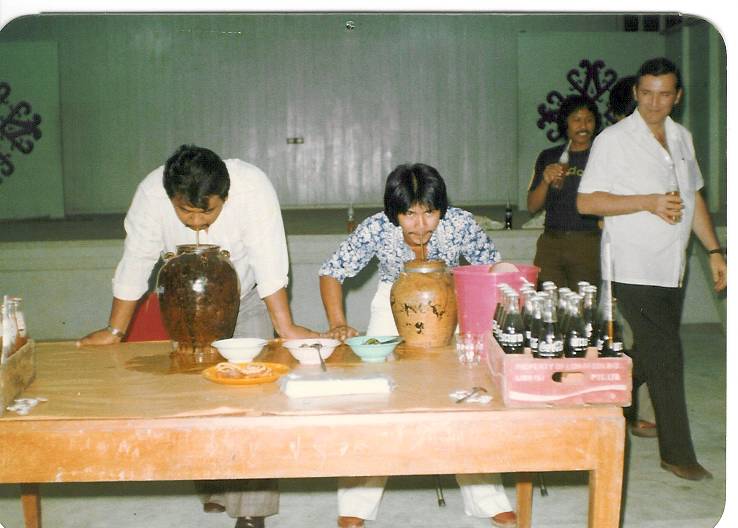 On the Tuesday evening the members held a 'Tapai' party for me in the 'Kelab Belia' or meeting hall. I had been warned to go very easy on the Tapai or Rice Wine, by Rajah Indran, but I felt it would have been rather churlish of me not to imbibe just a little, particularly as it was ostensibly for my benefit; I drank wine with the Area Commander, the Divisional Commander and the Nursing Corporal. I was told that it would be a very serious hurt to that person if I refused an invitation; indeed it was a high honour to drink Tapai with anyone. I think the young nurse corporal must have been highly honoured on a number of occasions; she drank Tapai like a fish. I joined the girls of the Division and danced the Zummerzu dance of the Kadazan. I was even forced into doing a solo spot in an impromptu cabaret, (The Tapai was good stuff). The only piece I could even remotely remember any words to was the Policeman's song from the Pirates of Penzance. I am not a solo artiste by any means, which they must have realised on the spot, because I was never asked to do it again. I thought it appropriate at the time, I am certain they didn't understand a word of it but they clapped and cheered anyway which goes to prove that the Tapai was good stuff! These lovely people presented me with a beautifully made straw hat of the Kadazan - Dasun tribe. It was the first of many presents, which I have treasured and still have.
On the Tuesday evening the members held a 'Tapai' party for me in the 'Kelab Belia' or meeting hall. I had been warned to go very easy on the Tapai or Rice Wine, by Rajah Indran, but I felt it would have been rather churlish of me not to imbibe just a little, particularly as it was ostensibly for my benefit; I drank wine with the Area Commander, the Divisional Commander and the Nursing Corporal. I was told that it would be a very serious hurt to that person if I refused an invitation; indeed it was a high honour to drink Tapai with anyone. I think the young nurse corporal must have been highly honoured on a number of occasions; she drank Tapai like a fish. I joined the girls of the Division and danced the Zummerzu dance of the Kadazan. I was even forced into doing a solo spot in an impromptu cabaret, (The Tapai was good stuff). The only piece I could even remotely remember any words to was the Policeman's song from the Pirates of Penzance. I am not a solo artiste by any means, which they must have realised on the spot, because I was never asked to do it again. I thought it appropriate at the time, I am certain they didn't understand a word of it but they clapped and cheered anyway which goes to prove that the Tapai was good stuff! These lovely people presented me with a beautifully made straw hat of the Kadazan - Dasun tribe. It was the first of many presents, which I have treasured and still have.
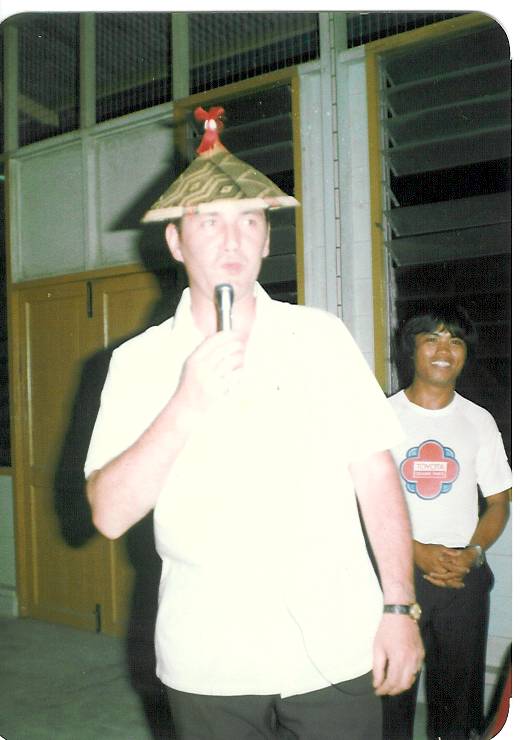 The following morning after breakfast, I was taken on a sightseeing tour around Keningau, before my afternoon trip to Tambunan.
The following morning after breakfast, I was taken on a sightseeing tour around Keningau, before my afternoon trip to Tambunan.
Tambunan is a very small town in the centre of the Interior Province. The St John Division there was in its infancy, having been started at the Local Hospital by one of the trained male nurses, who was being assisted by a local schoolteacher who was unqualified in First Aid. The Division was entirely a Cadet Division and required a lot of help and guidance. Most of the Children in the Division came in from the jungle Kampongs and were resident during term time. It was a matter of urgency that these children should be taut as soundly as possible, as it was it was extremely unlikely that many of them would remain within the Brigade once they had left school and returned to their Kampongs. Unfortunately due to the pressure of school time, I was only able to spend 3/4 hr, in the school with them. I spoke briefly about the St John organisation itself, but spent a little more time trying to emphasize the importance of being able to go home and even teach their own parents and friends the basics of First Aid.
I spent a lot of time with Richard Madanging the Officer in charge; I offered and gave him Organisational and Administrative advice. My impression of him was that he was a very capable Officer, and his ideas of how to run the Division were excellent. I think he was going to be a very big asset to the town of Tambunan.
The programme for the following day was arranged so that I could be back in Kota Kinabalu by lunchtime to give me some time to myself. Unfortunately my driver seemed to have a different agenda and decided to go off on a jaunt of his own; consequently I arrived back in the city, hot, tired and not a little annoyed at 6.p.m. This was the last time I saw the man, who had until that time been employed on the permanent staff at the St John Headquarters. His going was not a loss to the St John in any way.
Friday 16th February saw me up early to catch the 8.a.m. Flight to Sandakan. I found a window seat on the port side and settled down for the 40-minute flight. Shortly after take off the pilot drew our attention to the mountain of Kinabalu, and I saw the mountain towering high above the aeroplane, while below, a long way below was the green of the jungle canopy rising and falling like an enormous untrimmed carpet of green trees. The mountain seemed so huge and incongruous in its setting and very awe inspiring. 25 minutes later we landed at Sandakan.
Sandakan is a large seaport town on the North East coast of Sabah. Formerly it was the Capital and seat of government. I was met at the airport by a large contingent of members of the St John and promptly taken to see the area St John president, Mr Alexander Khoo.
Mr Khoo, as the name implies was Chinese, and a qualified Barrister at Law. He had taken his Law Degree in England, and had got his Silk in Birmingham Law Courts. He told me later on that he was very disturbed when he heard that I had been selected because my address was a Midlands one, and he had a very real fear that I would have a Black Country accent, because he had been in Birmingham as a Junior in the Law Courts and with all the witnesses either for or against a case in the courts, he had never understood a word they had spoken, if they had a strong accent, and he was concerned that bringing me over would be a complete waste of money if no one understood a word I said.
I was then taken to the 'Rumah St John' a large impressive building built particularly for the St John and obviously well administered. Here I met Mr Francis Tan, the Divisional Superintendent and a schoolteacher at the local Vocational Training School. Mr Tan, although not the most senior, was certainly the most efficient and the sheet anchor of the St John in Sandakan. Mr Tan and I sat down to discuss the programme he had prepared, I was then taken to the Hotel Sabah, where I was to stay; after a rest and lunch I was taken on a tour of the town and to see the Area President.
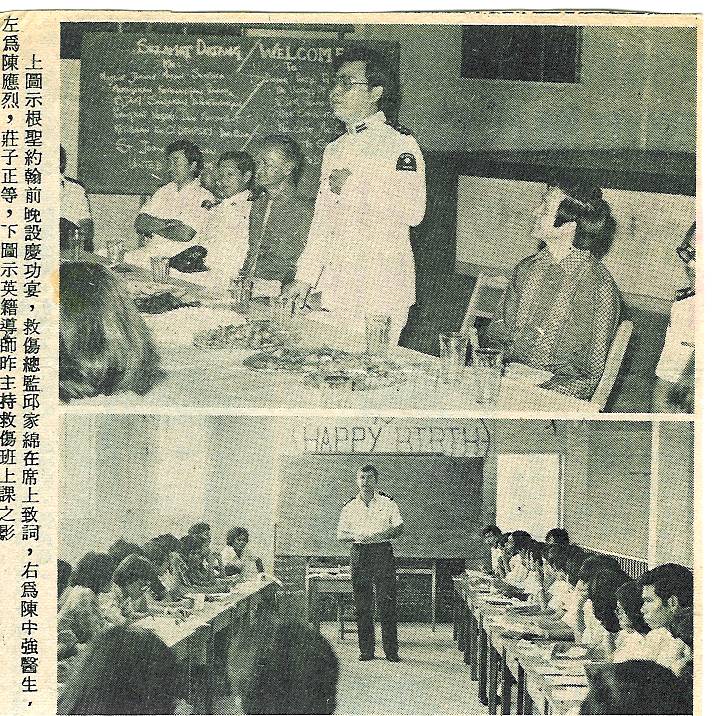
(The pictures on the right were taken for the Chinese newspapers. Mr Khoo is the gentleman standing with Mr Tan on his Left.
The lower picture shows me giving a lecture to a class of teachers.)
The following day Saturday, it was arranged that I should start a Lay Instructors Course in the afternoon and that this should continue into the evening, at which time I proposed to show the first two parts of the Naval Films, followed by a short discussion by the students. That morning however, I was requested at a moments notice to give a lecture to the St John members who had turned out specially. I spoke to them about the Basic Principles of First Aid until mid-day. The afternoon started at 2.p.m. I was told there would be between 20 and 30 people present, when I arrived about 15 minutes early to start the class there were 56 people waiting; 65 finally arrived that day. The following day the class had grown to over 80 so I stopped counting. The evening shows on both Saturday and Sunday were well attended by Students from the Teacher Training College, St John Members together with a few relatives and friends. Unfortunately the projector provided for the film had no sound on it so I found myself giving the commentary instead. I had seen these films so many times; I think I was almost word perfect, but I usually use these films to give myself a rest from time to time.
I found the reception in Sandakan a little overwhelming, those who could not understand English all that well were bringing their own interpreters and I was being translated into three or four languages simultaneously. It seemed to put a heavy sense of responsibility on me and I found it mentally exhausting. It was well outside my experience that so many people should want to hear me speak. It became a regular feature that I should start a class in a reasonably sized room and after the first lesson to have to move into a larger room or hall.
One of the evenings I was taken by Mr Khoo and a few of the selected Officers to a dinner in one of the more select restaurants beside the sea, and introduced to a dinner called the Steamboat. We all sat round a circular table which had a round bowl let into its centre. The centre of the bowl was funnelled upwards to form a chimney. Water was poured into the trough of the bowl around the chimney and a large gas cylinder underneath the whole was lit through a gas ring to heat the water. Then the waiter poured meat, fish and a whole host of other edibles into the soon to be boiling water. While we waited for our meal to cook was a good time to sample the wine and have a chat. When the meal was deemed cooked to everyone's satisfaction, we all helped ourselves by taking out morsels of the food with chopsticks. The waiters making sure that the bowl was never empty until everybody had eaten enough. The whole ceremony made for a superb evening, which I enjoyed immensely.
Whilst I was at Sandakan I was taken to 'Sepilok' the World Famous National Conservancy Park where Captive or Injured Orang-Utan (Orang means man, Utan means woods, hence Wild man of the Woods), together with other wild life, are taken for wounds and illnesses to be treated and the animals returned to the wild. I saw a clouded Leopard, several Gibbons, and a gaunt looking Vulture Stork with a broken wing. I was taken through from the animal hospital into a clearing in a fenced off part of the rain forest, with a keeper and a number of buckets full of bananas. The keeper started to call out the names of the Orang, and as each name was called an animal would come from a lean-to shelter on the ground or start climbing down from a branch high in a tree to collect a large handful of bananas. Certain brave Gibbon monkeys would try to rush in and steal a hand if they could, but the Orang were pretty swift when they had to be and the Gibbon was rarely successful. The Orang is a surprisingly gentle creature and the baby's craved attention wanting to be cuddled. After leaving Sepilok I was taken to a crocodile farm where the beasts are bred for their skins for ladies handbags and shoes. This was probably the most obnoxious sight I've ever seen. I wanted to see them but they seemed fearsomely repulsive.
But I cannot leave Sepilok without telling of the most famous of its patients to date, namely MARIA. Loggers found Maria as an abandoned baby Orang Utan in the rain forest. (Her mother had almost certainly been killed or injured when the loggers had destroyed their home.) She was still being breastfed when brought in to Sepilok, so it was vital that one of the keepers should bottle feed and care for her on a one to one basis. This was done, and over a period of time, as the gamekeeper was the boss of the Hospital, Maria assumed she too had a vital role to play in managing things, further as she could communicate in fluent Orang. Who was to argue? Maria matured and after a while, when she was old enough she was freed into the jungle clearing, to be able to go native, and it was hoped would one day to climb over the fence. A simple thing for an Orang to do, as it only had to move across the jungle canopy above the fencing to complete freedom. This was an intentional oversight on the part of the keepers; as the keepers wanted all the animals to go back into the wild in their own sweet time, and if they felt insecure, they could return in the same way to see the doctor so to speak. Many did come back and allowed the keepers to examine them and treat any injuries they may have sustained, and then they would disappear again. Orangs reach maturity at the age of Eight years. They live normally to the age of Forty years or thereabouts. After having lived the life of a queen in the jungle clearing, one day round about her eighth birthday Maria disappeared. She had been missing before for a short foray lasting a day or two, then for a bit longer, but this time it was for good, and all the other animals seemed to know it. I suspect that private lives are not all that private in the wild. It was a bit of a relief to the keepers in a way. It seemed she had found herself a mate, and had recently been showing a hostile attitude to female keepers and indeed any female visitors to the clearing. Maria would attack them, particularly if they were anywhere near her own special keeper. The Orangs gestation period is nine months the same as a human, so it was no surprise when some ten months after her disappearance, the keeper went in to feed the animals at the normal feeding time but none of the animals would respond. They all kept well back until the head keeper, acting on a hunch called for Maria. There was a lot of disturbance at the far side of the clearing in some bushes, and then Maria appeared carrying her own little baby. She went straight up to the head keeper and handed her little baby over to him, then watched to see what he would do. The keeper made a fuss of it and gave it a quick cursory examination, looked up to see Maria had gone to get her bananas, just keeping away from the other animals, just watching the keeper. The animals kept well away from her, but she wouldn't retrieve her baby or let the keeper put it down, Maria didn't settle until she saw him take it back into the Hospital, then she relaxed. The keeper brought the baby back every day, but Maria wouldn't go near as if to say, you know how to look after her, so now she's yours. After a week, Maria disappeared back into the rain forest. She came back from time to time and knew her own child when the baby was big enough to be allowed into the clearing. Then she went altogether and hadn't been seen for some while at the time of my visit.
My visit to Sandakan was concluded with a presentation of Certificates to all those who had attended my course of lectures. The certificate was designed by Francis Tan and was intended as a souvenir for each student and signed by myself. I was afterwards presented with a Pewter Plate engraved from the Sandakan St John.
The original programme had been arranged so that I would travel from Sandakan to Tawau to the South East. But the Brigade members at Lahad Datu, a small coastal town midway between the two pleaded that I should visit them as well. My itinerary was accordingly rearranged and I stopped there for one day. Rahim Ali, the Brigade Superintendent, whom I had met previously at the Kota Kinabalu State Competitions, met me at the airport. I also met Mr Chan Sou Kong (A Sabahnese - despite the name), the Area President.
Time did not allow for a protracted course, so I went to one of the local schools that evening where before an audience of some 130 teachers and pupils and St John Members I gave a very brief discourse on First Aid and showed the films yet again. The films are an excellent teaching medium even if they do become tedious to the demonstrator. I spent more time with Mr Chan and Rahim Ali. Mr Chan is a director in a logging firm and was very interested in discussing the ever-present problem of Industrial Injury. He was naturally very guarded about how serious the problem was in his particular business, but it was obviously serious enough for him to express a lot of concern. The need here again for an in depth course on First Aid in Industry, I think with particular emphasis on the longer term care of patients and the removal of casualties to more intense medical care was of paramount importance.
My stay in Lahad Datu was all too brief, but I hope helpful, as the next morning saw me on the early morning flight to Tawau where I arrived at 8.30.a.m. The Area Commander Mr Yapp Man Siu, and the now familiar host of smiling faces met me. Some of the smiling faces I recognised from Kota Kinabalu, and when I acknowledged the ones I recognised, their extended grins nearly separated the chins from the rest of their faces. As soon as I had passed through the security barrier into the airport buildings I was hustled into the Cafeteria, and while a cup of coffee was being produced my programme was discussed and I found that Mr Yapp Man Siu wasted no time in telling me what I was to do, when I was to do it and where. I was waiting for him to tell me how. He had completely rearranged my schedule without any consultation with Kota Kinabalu. I wanted to help and do all I could to help them but I got a very strong impression that if I didn't put my foot down very strongly I was going to be worked to a standstill and beyond the limits of exhaustion. What put the cap on it for me was when Mr Yapp Mann Siu had cancelled my return flight on Sunday and rearranged it for Monday evening. I asked the rest of the contingent if they would leave Mr Yapp Mann Siu alone for a moment, I saw the grin on the face of the Superintendent, Chung Oi Min, as he quickly ushered the rest away to waiting vehicles while I whispered a few sweet nothings to Mr Yapp. Who went straight back to the booking clerk and got me a return flight first thing on Monday morning as the original flight was now fully booked. I was not well pleased because I was to have had the Sunday off when I got back to Kota Kinabalu, and I had another class booked on the Monday morning.
I very much liked working in the schools in Tawau. The response from the children and the teachers was very rewarding, and I managed to make them laugh a lot. The course in the evening for potential instructors was also well attended with a Sergeant from the Army, a Police Sergeant and an Officer and six men from the 'Bomba' or Fire Brigade. Mr Yapp also attended the evening sessions and I quickly learned that he was particularly concerned with Coronary conditions. I chose my moment and then went into great detail about Coronary conditions and quickly had him terrified, he was the only one who didn't realise I was winding him up. He was not a popular man, but he was a very rich and powerful man in the city. He was had a paranoia about sudden death caused by heart failure, and was most keen everyone should become expert to be able to deal with him should such an unfortunate event occur. I think if such an event did occur there would be a sudden spate of masterly inactivity. He was obviously a very unpopular man.
Mr Yapp (seated on my left in the picture below in the darker uniform), had read about my presenting certificates at
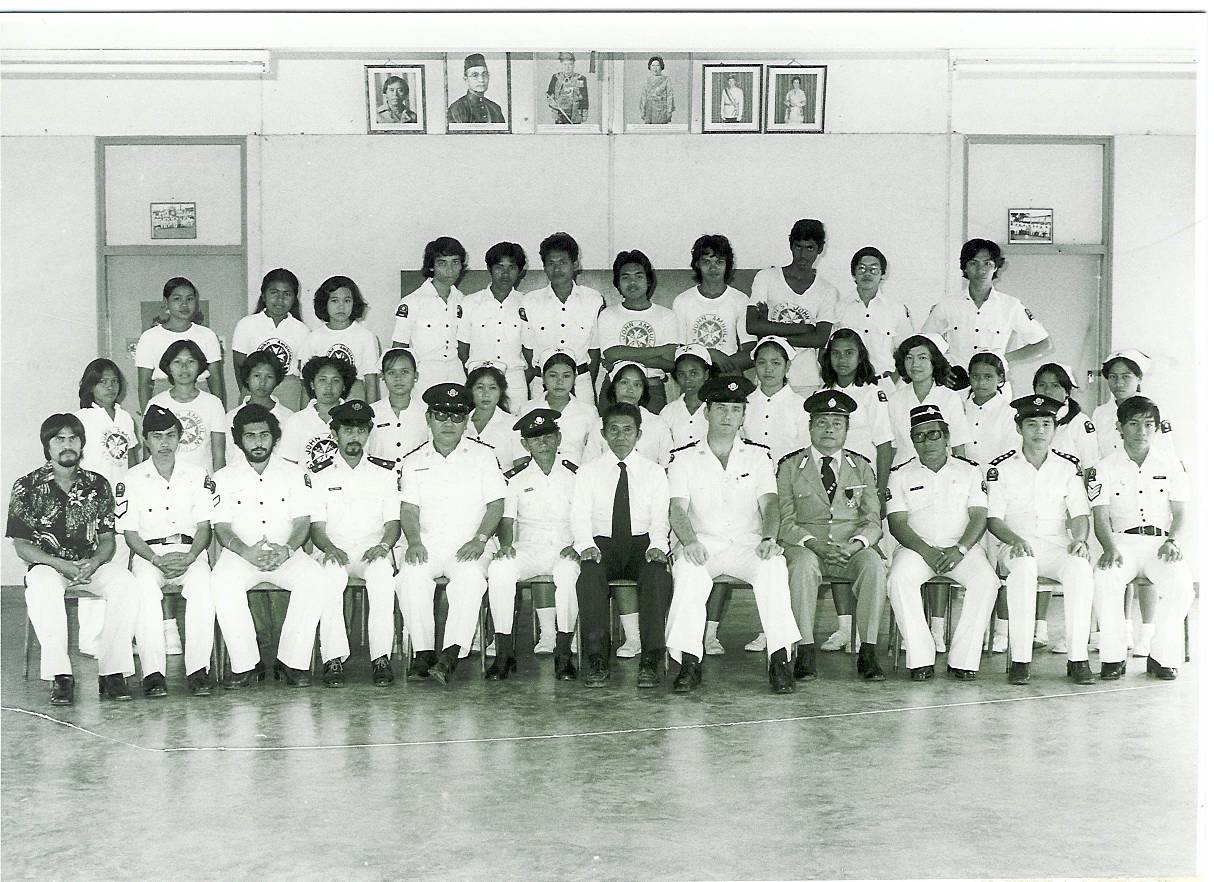 Sandakan in the Chinese Press, and asked me to do the same for him. He didn't like to think he had been outdone by Sandakan. I agreed to it being done providing that the certificates were to be issued for attendance only and NOT as a certificate of any kind of qualification. He then had the cheek to borrow my copy of the certificate so he could duplicate it after it was amended for Tawau, and put a copyright seal on it.
Sandakan in the Chinese Press, and asked me to do the same for him. He didn't like to think he had been outdone by Sandakan. I agreed to it being done providing that the certificates were to be issued for attendance only and NOT as a certificate of any kind of qualification. He then had the cheek to borrow my copy of the certificate so he could duplicate it after it was amended for Tawau, and put a copyright seal on it.
During my stay in Tawau I was accommodated in one of the State Rest Houses, this particular one was one of the best and most comfortable. Unfortunately there was no European cuisine and I was limited to Malay or Chinese food. Mr Yapp commandeered my rest times at lunchtime and in the evening and talked interminably about real or imagined problems within Tawau. There was a problem and he was it, and I mentioned it strongly to Dr Dingley and Rajah Indran who were well aware of it. They were just a little curious to see how I dealt with it. Suffice to say Mr Yapp was mentioned in my final despatches to the Commissioner in Chief.
According to the syllabus as laid out by Mr Yapp, I was expected to conduct an examination for Lay Instructors. I told Mr Yapp that I was not authorised to do this without the necessary paperwork and Authority from Kuala Lumpur, and this was not forthcoming. However to save face I agreed to a small question and answer assessment of the persons he wanted examined. I questioned 11 Officers and members of the Division and failed 2. When I finally left Tawau on Monday morning 26th February I felt mentally drained.
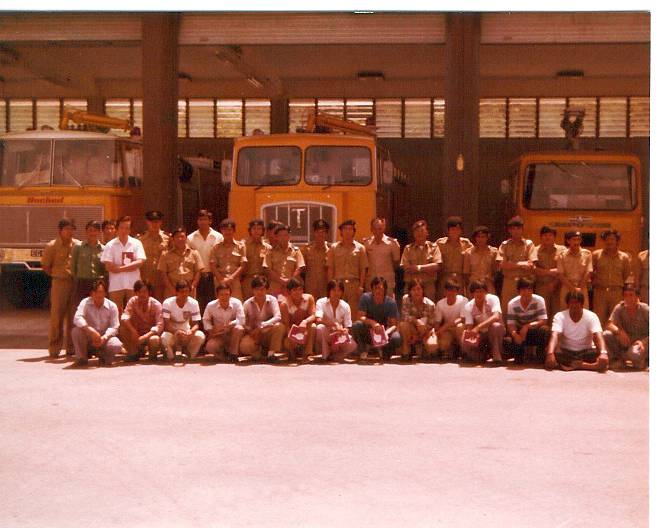 From Monday 26th February until Thursday 1st March inclusive I conducted a series of pure First Aid classes during the day for the Police Force and Civil Aviation Fire Service. In the evenings I had a class of girl students from the 'GAYA' college who would be Girl Guide Leaders on Graduation from their studies. It really was a delight talking to these refreshing young ladies after the hard-bitten Police and firemen. The girls were a very attentive class and eager to learn. The Police were there because they had been told to be there and like all Policemen appeared reluctant. I always found Police the most difficult to teach; as a general rule they either do not wish to know, or think they already know all they need to know, or are of the opinion that doing First Aid is not their job. I had a lot of experience with these attitudes in England so I was not in the least bit surprised to find it in Sabah also. They were very obedient and polite, but to me that is not enough. The first half hour was jolly hard work, but by then I had them relaxed, smiling and beginning to ask or answer questions, then the morning session flew by. I think they enjoyed it, as on the odd occasion I met one or other of the members of the class afterwards, when they were on duty, they actually smiled and waved to me, sometimes to the utter amazement of any passengers who were with me at the time. One Policewoman even invited me to her home to meet her husband, I was truly sorry I was not able to go. But they were all amazed to know that as a Policeman I had only ever carried a truncheon and never ever carried a gun, particularly as I told them I was always on street duty of one kind or another and must have arrested hundreds of people in my time.
From Monday 26th February until Thursday 1st March inclusive I conducted a series of pure First Aid classes during the day for the Police Force and Civil Aviation Fire Service. In the evenings I had a class of girl students from the 'GAYA' college who would be Girl Guide Leaders on Graduation from their studies. It really was a delight talking to these refreshing young ladies after the hard-bitten Police and firemen. The girls were a very attentive class and eager to learn. The Police were there because they had been told to be there and like all Policemen appeared reluctant. I always found Police the most difficult to teach; as a general rule they either do not wish to know, or think they already know all they need to know, or are of the opinion that doing First Aid is not their job. I had a lot of experience with these attitudes in England so I was not in the least bit surprised to find it in Sabah also. They were very obedient and polite, but to me that is not enough. The first half hour was jolly hard work, but by then I had them relaxed, smiling and beginning to ask or answer questions, then the morning session flew by. I think they enjoyed it, as on the odd occasion I met one or other of the members of the class afterwards, when they were on duty, they actually smiled and waved to me, sometimes to the utter amazement of any passengers who were with me at the time. One Policewoman even invited me to her home to meet her husband, I was truly sorry I was not able to go. But they were all amazed to know that as a Policeman I had only ever carried a truncheon and never ever carried a gun, particularly as I told them I was always on street duty of one kind or another and must have arrested hundreds of people in my time.
The firemen at Kota Kinabalu airport were a most unusual class in my experience; to them I was a distraction from their normal chores, and I think, a welcome relief. They were a very interested in what I had to say and demonstrated a very basic knowledge. I had done my homework before I went to see them, and had learnt what their drills were and what training they had had for an airport emergency. I asked them to show me haw they would rescue, first a conscious casualty with an obvious chest wound, and secondly the rescue of an unconscious casualty. Two points came out immediately; unlike my experience with the Fire Service in this Country, they made all rescues in pairs, a point I liked, but they spoiled it by laying all the rescued casualties flat on their back. The need for speed is paramount, I also understood that the fireman does not want or need to be required to make any more decisions than is necessary for his own and the patients' safety. All training therefore should be directed toward a routine drill. In the real situation he knows that medical teams are on their way. The urgency therefore is reduced to containing all passengers in a place of safety, ensuring all casualties are breathing and that any bleeding is arrested. I suggested a slight amendment to their drill, which I hope they will include as a permanent feature. I made them put all rescued casualties in the recovery position or as I like to call it the 'unconscious position'. If the casualties were conscious and able they would very soon assume a position more comfortable to themselves; if they were deeply shocked as a result of internal bleeding for example, or unconscious, they would stay in that position and chances of survival would be enhanced a thousand fold. Medical teams would immediately recognise their priorities. I demonstrated at great length the quickest and most efficient way of doing this, including carrying a patient on a stretcher in this position, something they had never seen done before apparently. My impression was that they greatly appreciated all that I had shown them, and that they would certainly be practicing the new techniques. The senior Officer Mr Paul Lee wanted me to go to the other airports in Sabah, at Sandakan, Lahad Datu, Tawau and Labuan to instruct them also. He seemed genuinely sorry when I explained with regret that I had already been to most of these places and did not have time to return.
The next three days, Friday, Saturday and Sunday were spent at the Gaya College, where Mrs Jane Funk hosted me. Puan Jane Funk had recently accepted the position of State Cadet Officer from Rajah Indran and as a Senior Tutor at Gaya College was ideally suited to the post. The students at the college to whom I would be talking numbered about 50.
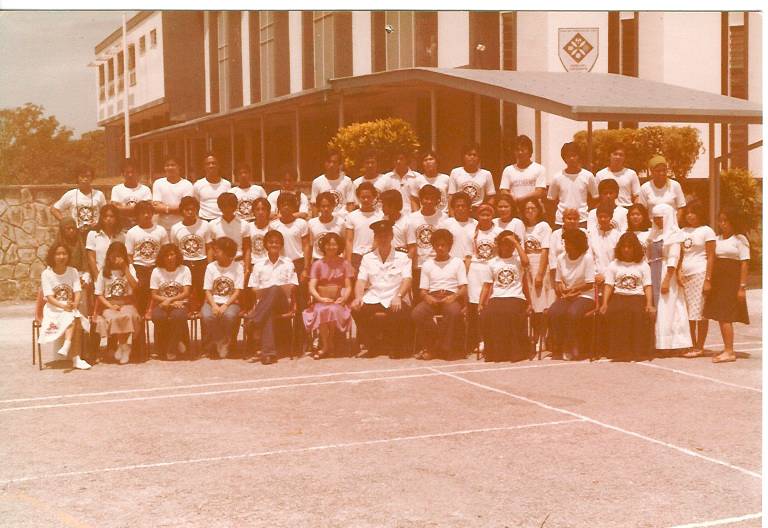
The Gaya College is a teacher training college. It is mandatory that all students at the college undertake training in one of the youth Organisations approved by the State. The training they were to undertake was to enable them to become leaders in these extra curricular pastimes of their future students. The youth organisations included Scouting, Guiding, Red Crescent (Cross), St John Ambulance and so on. The students in my study group in the above picture were potential leaders and junior Officers in the St John. As I mentioned earlier, a large number of school children were in residence at their various schools all week, or sometimes for the whole term because of the journeys they had to make to get to school from their homes in the village kampongs.
I was able to go into far more detail in the First Aid syllabus with these young people. It gave me my first and only real opportunity of demonstrating the use of the National Coal Board Slides and tape cassettes. I picked on one young Chinese girl who happened to be a Roman Catholic Nun; she was also the most timid person I have ever met. I told her I had selected her to give a half hour lecturette on "Blood, its Constituents and Bleeding" to the rest of the class there and then. I've never seen a Nun say so many 'Ave Maria's' or 'Pater Nostras' so quickly in my life. I think she was praying for instant death. I'd set up the screen and the Coal Board Slides, together with a tape recorder. I then gave her the lead for the slide projector and told her to do exactly as the commentary instructed. At the appointed moment she pressed the button to change the slides exactly as directed. After the half hour was up the slides and tapes were finished. I congratulated her. The lesson was learnt very well indeed by her and every other student and lecturer in that room. Her face was a picture of delight and relief. There was no shortage of volunteers to show other sets of slides.
These talks were not concerned with the teaching of First Aid alone, but also with the actual paper work, and Insurance responsibilities. To add variety to their meetings, and not confine it absolutely to First Aid and Nursing. There were a number of people outside the St John with skills and hobbies that could teach the young people other subjects for their Grand Prior Badge. There was not as yet a single Grand Prior Cadet in the whole of Sabah. Who would get the first cadet to win the award? It gave them all a lot to talk, and think about.
I had to move on and visited the Rangers in the national park of Kinabalu and went up the mountain with them. They showed me their kit, which was very sophisticated and included such things as inflatable splints, but almost every single one had been chewed at by some tiny forest dweller and was now useless. I was not in favour of these anyway, as most rescues from high up the mountain were completed by helicopter, and inflatable splints expanded in reduced air pressure so in an un-pressurised aircraft, they would expand and constrict blood flow completely, and if left for too long would cause tissue death and gangrene. They showed me how they improvised splints and used spiders webs to stop bleeding and moss grown in abundance in the rain forest to pad splints, an excellent medium and far more comfortable that any man made fibre. A fascinating three days.
I flew to Labuan afterwards to find a whole heap of troubles. I suspected there was some sort of scam going on within the St John Division, I organised that an immediate Audit of their affairs might well bring some interesting result. I don't know how it was resolved except that for myself it was three wasted days. The organiser of my visit was more concerned in getting his own Instructors certificate renewed and after I saw his performance I would be very loath to qualify him in any standard at all let alone rate him as an Instructor. I took his certificate from him and gave it back to Rajah Indran with my own comments, which I am sure were duly noted.
My return to Kota Kinabalu left me with just ten days to complete a packed programme. I felt I could quite easily have kept myself fully occupied for two years. I spent three mornings with the ports authority. They had sustained a serious accident that morning when a stevedore was badly injured. Bad handling complicated his injury and he arrived in hospital in a serious condition. I spoke at length with the Personnel manager and suggested that the Docks Police might be trained in depth with first aid so that they could contain a situation long before an Ambulance could attend. I felt that they should have a properly equipped ambulance and be trained in the use of it, indeed I would make it a condition of their service that they were qualified, I also suggested that there should be First Aid boxes at strategic points around the dock area and was a little surprised that this was not already the rule.
Another course was arranged for the evenings in the Rumah St John for the Scout Commissioner and his senior staff. A young Chinese girl who was an Officer in the Red Crescent came and pleaded with me to talk to her unit. I only had one afternoon available for me to go, so she got the benefit of it.
I had another Police class to attend and a fascinating trip to a town called Tuaran where I talked to a class of ladies from a coastal village called Surusup. I didn't find out what the connection with these ladies was, they were from a small fishing village built on stilts which went right out into the sea, they had wooden walkways between the homes and small boats for fishing or going shopping. It goes without saying that accidents were commonplace and it was invariably the women of the village who had to deal with the incidents when they occurred. Their homes were on an equivalent social standing as Council Houses here. They spent the whole time teasing me, they only spoke Bahasa Malay, but they obviously understood a lot of English, so I suspect most of their chat about me was a bit near the knuckle, but we all enjoyed the whole afternoon.
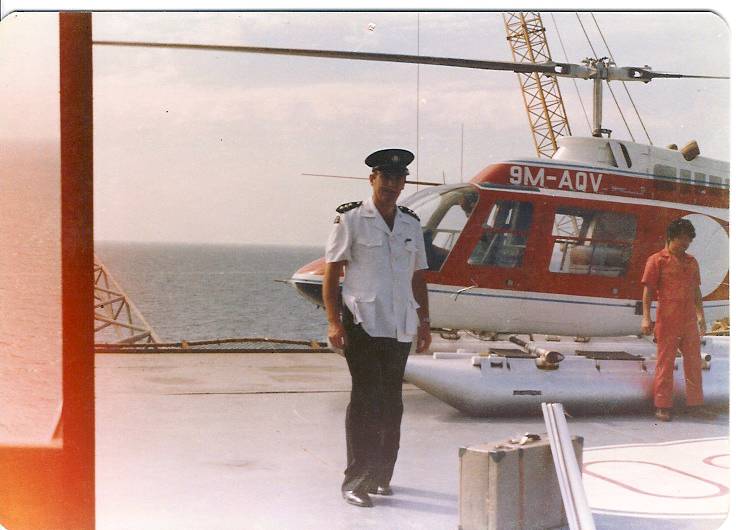 The course that had been arranged for me at the Rumah St John, in Kota Kinabalu had started off at a respectable number of 12 members. As I have stated above they were organised for the Boy Scout Organisation, and the class members were mainly academics, teachers and so on, but there was also a smattering of Office Staff from the State Offices including a secretary from the office of the State President. But after the first day the classes began to get larger again, so that at the end of the week and near the end of my visit, one of the Class members stood up and introduced himself as one of the Senior Head teachers in the city. He confessed to me that he was responsible for the class getting larger, because he had actually been on State Radio to encourage Teachers and in particular head teachers to attend my classes; not for the content itself, although he said that the information was invaluable, but he wanted them to try study my teaching techniques, because he maintained I had a talent which could not be obtained from books, and they might learn something to their advantage. (This had to be true, because I had never been taut to teach.) One point he made in particular was that despite the cultural and religious differences within such a small class, I had made the whole class laugh and learn, and that inside every bit of humour there was a lesson and nobody was injured or insulted in any way. He had thoroughly enjoyed the class and had gained a tremendous amount from me. He gave me the Scout Tenderfoot badge for Malaysia and a Pewter plate engraved for me to remember them by. The Secretary had a Police Despatch rider sent to Dr Dingley's house, where I was staying at that time, with an invitation to attend at the ISTANA for a Banquet being held by the Malaysian President in honour of a visit by the British High Commissioner. I was beginning to move in high circles, and I was becoming very tired and dizzy by it all. I really was beginning to get a little homesick and I wanted to come back down to earth.
The course that had been arranged for me at the Rumah St John, in Kota Kinabalu had started off at a respectable number of 12 members. As I have stated above they were organised for the Boy Scout Organisation, and the class members were mainly academics, teachers and so on, but there was also a smattering of Office Staff from the State Offices including a secretary from the office of the State President. But after the first day the classes began to get larger again, so that at the end of the week and near the end of my visit, one of the Class members stood up and introduced himself as one of the Senior Head teachers in the city. He confessed to me that he was responsible for the class getting larger, because he had actually been on State Radio to encourage Teachers and in particular head teachers to attend my classes; not for the content itself, although he said that the information was invaluable, but he wanted them to try study my teaching techniques, because he maintained I had a talent which could not be obtained from books, and they might learn something to their advantage. (This had to be true, because I had never been taut to teach.) One point he made in particular was that despite the cultural and religious differences within such a small class, I had made the whole class laugh and learn, and that inside every bit of humour there was a lesson and nobody was injured or insulted in any way. He had thoroughly enjoyed the class and had gained a tremendous amount from me. He gave me the Scout Tenderfoot badge for Malaysia and a Pewter plate engraved for me to remember them by. The Secretary had a Police Despatch rider sent to Dr Dingley's house, where I was staying at that time, with an invitation to attend at the ISTANA for a Banquet being held by the Malaysian President in honour of a visit by the British High Commissioner. I was beginning to move in high circles, and I was becoming very tired and dizzy by it all. I really was beginning to get a little homesick and I wanted to come back down to earth.
There were just one or two final duties, which I had to attend to. One involved a Helicopter flight out into the South China Sea to visit an oilrig. I did a couple of hours talk there and was taken for a tour of the rig, which was fascinating.
The dinner at the Istana was very entertaining as well. I was left very much to myself to just enjoy the evening and relax. I was of course greeted in the usual way, neither of the dignitaries knowing who I was or why I was there. This was not true of the Security Police or Special Branch. I sussed them the minute I walked through the arched entrance, and in Police parlance, they clocked me simultaneously. I enjoyed just moving around and just being in a mixture of complete rest and high tension. I thought I would just wait and see what happened. I saw the place swap, when someone found his place next to me had been moved and I had a Special Branch Officer seated on my right. He was so polite and smooth but the look on his face when I took out my Warrant Card was a picture. He was instantly curious to know why it was his department hadn't been told, and when I said I didn't know I was going to be there myself until a few hours before. I told him it was a pity they didn't read all the Chinese papers, because I had been featured in them for several weeks. I was there as a guest of the Senior Minister as far as I knew, and produced the invitation card. The Special Branch appreciated the joke and even had a bottle of wine put in front of me. I thoroughly enjoyed that incident.
My flight home was delayed by one day, because I had two final functions to attend. The first was to attend the Chief Minister Datuk Harris Moh'd SALLEH in his Offices where I had morning Coffee. He thanked me for the effort I had made during my stay and said he only wished he could get half the commitment from his own staff. He then asked me if there was any thing I thought could be done to improve the facilities in Sabah.
I told him the one thing I would do, or try to do if I were in his position would be to deal with the problem of his Ambulance Service. At that time it comprised a driver somewhere in the Medical Post or Hospital and a vehicle in an adjacent yard that could carry a stretcher. It was unlikely that the driver knew any first aid, or if he did that was a bonus. The vehicle would be hopelessly inadequate. I strongly recommended that they consider training Firemen and gave them the secondary responsibility of being the 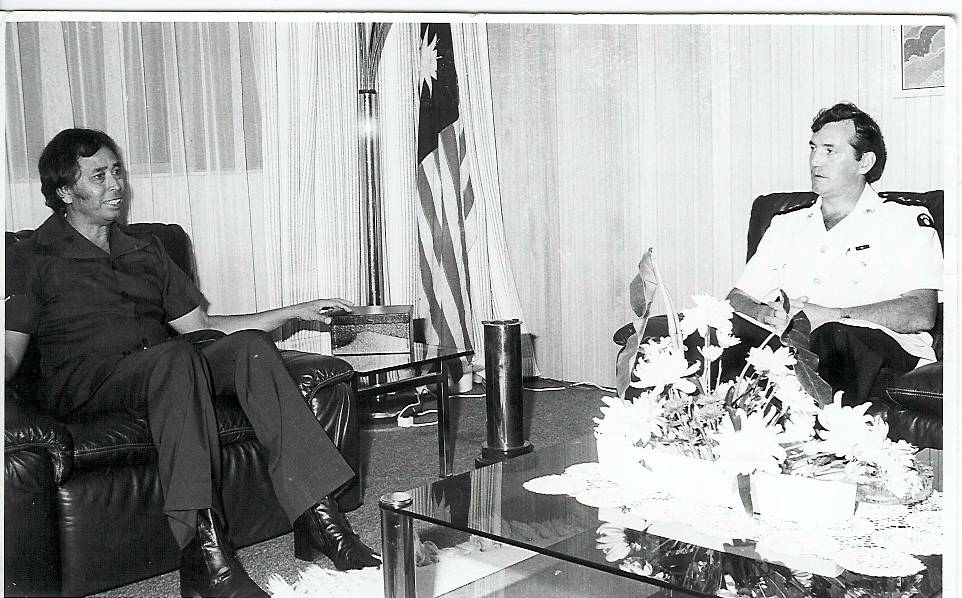 Ambulance Service. Going around the State I had not passed a Single Fire Station where there were not at least half a dozen men playing volleyball. These men were already involved in a built in Emergency system, so there wasn't an expense of setting up a new one. They were by the very nature of their work disciplined, so response after training was not a problem. They were already on the State payroll, so that was taken care of; certainly upgrade the men if they qualified in both fields, but they should be forced to become trained in First Aid as a condition of
Ambulance Service. Going around the State I had not passed a Single Fire Station where there were not at least half a dozen men playing volleyball. These men were already involved in a built in Emergency system, so there wasn't an expense of setting up a new one. They were by the very nature of their work disciplined, so response after training was not a problem. They were already on the State payroll, so that was taken care of; certainly upgrade the men if they qualified in both fields, but they should be forced to become trained in First Aid as a condition of 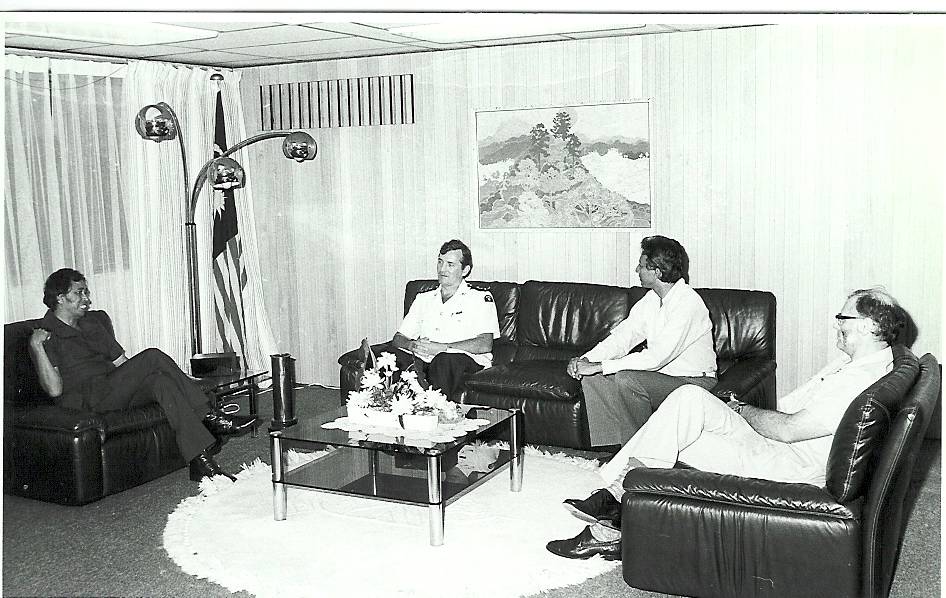 employment the largest expenditure then initially, would be the cost of buying and equipping Ambulances, the next highest cost, but most urgent need would be the training of the firemen. There were women working in Fire stations as secretarial staff and so on, there was no reason why they too shouldn't become involved, particularly where there was a problem of men treating women in emergency, where there was some religious constraint.
employment the largest expenditure then initially, would be the cost of buying and equipping Ambulances, the next highest cost, but most urgent need would be the training of the firemen. There were women working in Fire stations as secretarial staff and so on, there was no reason why they too shouldn't become involved, particularly where there was a problem of men treating women in emergency, where there was some religious constraint.
I have never seen a senior person react so vigorously to anything I said. He clapped and laughed saying he always got angry when he passed the fire station and saw the men playing games. He agreed that the Ambulance Service was in a pathetic situation and had always wanted to do something about it. He looked at me sideways as he mentioned the St John had the responsibility. I said they had the responsibility, but they were volunteers, but the costing and equipping seemed to be divided between the Hospital Authority and the St John, leaving the St John as the poor relation. In practice it aught to either be taken over in an official capacity or have a separate professional organisation accept the responsibility like the Fire Brigade and leave the St John in its other role of voluntary support, and running training programmes. As I left, I made a presentation to the Minister of a piece of Brierley Crystal from the St John in England. He gave me a parcel beautifully wrapped, which I kept closed to let Elisabeth open as a surprise.
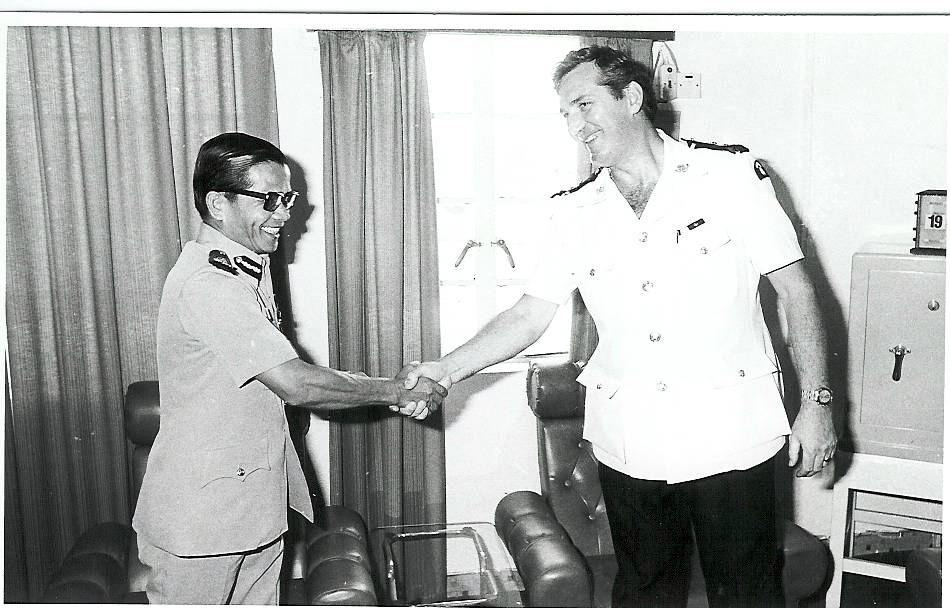 I was rushed way from this meeting to the top hotel where I was to be entertained by the Chamber of Commerce. Fortunately apart from making a few polite platitudes I wasn't expected to say anything, just enjoy the meal.
I was rushed way from this meeting to the top hotel where I was to be entertained by the Chamber of Commerce. Fortunately apart from making a few polite platitudes I wasn't expected to say anything, just enjoy the meal.
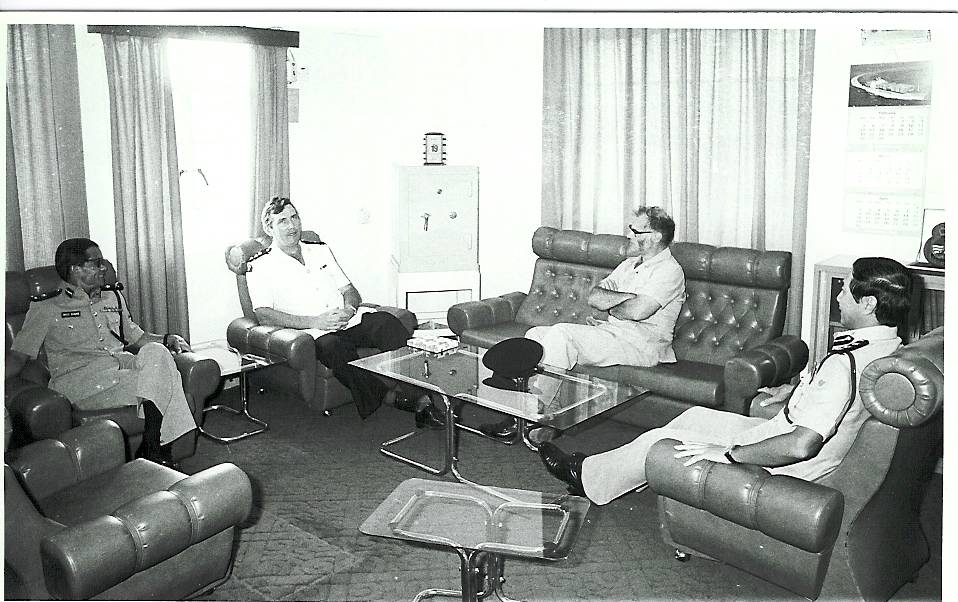 After I left the dining room, I found a Police Chief Inspector waiting for me in the Foyer. He escorted me to a waiting saloon, and I was taken to the Police Barracks where I was taken to meet the Commissioner of Police. The police barracks was a very military affair, and as smart as any Guards Barracks in this Country I was particularly impressed when the sentry gave be a but salute as I was swept through the gates in grand style. I presented him with a West Mercia Police Plaque and he returned the compliment by giving me a Malaysian Police Plaque, the joke of the day being that they were both from the same factory in Birmingham.
After I left the dining room, I found a Police Chief Inspector waiting for me in the Foyer. He escorted me to a waiting saloon, and I was taken to the Police Barracks where I was taken to meet the Commissioner of Police. The police barracks was a very military affair, and as smart as any Guards Barracks in this Country I was particularly impressed when the sentry gave be a but salute as I was swept through the gates in grand style. I presented him with a West Mercia Police Plaque and he returned the compliment by giving me a Malaysian Police Plaque, the joke of the day being that they were both from the same factory in Birmingham.
We had a pleasant hour talking about the differences between the Malaysian force which was paramilitary and the British which was definitely not so at that time. Regrettably the tendency seems to be more toward the carrying of arms, which I think, is very sad.
My last evening in Sabah I was taken out for a 'Romantic' feast by the Chinese nurses who had welcomed me on my first night. (Sorry no pictures) I was taken to the Airport restaurant for a steak meal with wine and all the trimmings. They were all in their 'Sexiest' dresses and after the meal they took me for a midnight stroll along the beach so we could all paddle in the sea. They really were superb fun. They next day I started my return flight back to U.K. and Civilisation?
| Copyright © 2005, The Dempsey Family | |||
| Please send your comments to ccd@ | classicbookshelf | com | |